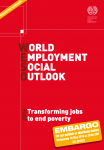A global deficit in decent, quality jobs and declining economic conditions in several regions has the potential to undo decades of progress in poverty reduction, cautions a report by the International Labour Organization (ILO).
The report concludes that more and better jobs are necessary to eradicate moderate and extreme poverty globally by 2030.
 18 May 2016: A global deficit in decent, quality jobs and declining economic conditions in several regions has the potential to undo decades of progress in poverty reduction, cautions a report by the International Labour Organization (ILO). The report concludes that more and better jobs are necessary to eradicate moderate and extreme poverty globally by 2030.
18 May 2016: A global deficit in decent, quality jobs and declining economic conditions in several regions has the potential to undo decades of progress in poverty reduction, cautions a report by the International Labour Organization (ILO). The report concludes that more and better jobs are necessary to eradicate moderate and extreme poverty globally by 2030.
ILO’s ‘World Employment and Social Outlook 2016: Transforming jobs to end poverty’ reports that 36% of the emerging and developing world lives in poverty. In developing economies, nearly one-third of the moderately or extremely poor have jobs, but these jobs tend to be in low-skilled occupations, vulnerable and unaccompanied by any form of social protection. Among developed countries, more workers have salaried employment, but some still fall into poverty. Since the start of the global economic and financial crisis in the European Union (EU), for instance, the incidence of relative poverty has increased by one percentage point. In Asia, Latin America and the Arab region, the report highlights the fragility of employment and social progress, with rising income inequality in some regions after decades of decline.
These findings suggest that “SDG 1 (End poverty in all its forms everywhere) is at risk,” ILO Director-General Guy Ryder said in a press release. He elaborated, “If we are serious about the 2030 Agenda and want to finally put an end to…poverty…then we must focus on the quality of jobs in all nations,” in line with SDG 8 (Promote sustained, inclusive and sustainable economic growth, full and productive employment and decent work for all). The report suggests that nearly US$10 trillion over 15 years will be needed to eradicate extreme and moderate poverty by 2030, stressing that income transfers alone will not be sufficient.
The report also highlights uneven progress on poverty across regions and across sectors within countries, with poverty remaining “stubbornly high in Africa and parts of Asia.” One-quarter of those employed in agriculture are in extreme poverty compared with 12% of those in industry and 7% in services.
High levels of income inequality reduce the impact of economic growth on poverty reduction, according to the report. “This finding tells us that it is past time to reflect on the responsibility of rich nations and individuals in the perpetuation of poverty,” said ILO Special Adviser on Social and Economic Issues, Raymond Torres. He concluded, “Accepting the status quo is not an option.”
The report recommends addressing structural challenges to reducing poverty and providing quality jobs, such as by tackling low-productivity traps and strengthening rights at work, to broaden the productive base through the promotion of sustainable enterprises. Additional recommendations address: enabling employer and worker organizations to reach the poor; designing employment and social policies; reinforcing governments’ capacity to implement poverty-reducing policies and standards; and making the rich aware of their responsibility. [ILO Press Release] [UN Press Release] [Publication Website] [Publication: World Employment Social Outlook Summary]